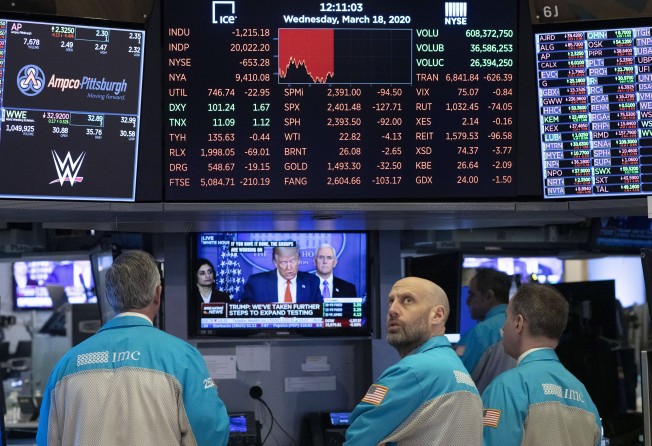Trump’s 11th-hour ban on Chinese stocks deprives US funds of some of the biggest returns and payouts in world’s second-largest market
- US President Donald Trump’s order to prohibit American investors from trading Chinese companies with military ownership will affect relevant listed units totalling US$440 billion in market cap
- The sanction will make US fund managers miss out on some of China’s publicly traded companies that deliver most decent returns and are most generous in dividend payouts

Donald Trump’s executive order banning American investors from holding stakes in 31 Chinese companies, expected to take effect nine days before he leaves office, would deprive US funds of some of the biggest returns and most generous dividend payouts in the world’s second-largest capital market.
The ban, covering at least 20 publicly traded companies with US$440 billion in market capitalisation between them, gives US investors 10 months starting from January 11, 2021, to divest their shareholdings, for what Trump said were used to fund the “Communist Chinese military.”
The ban list, compiled in June and August this year, but signed off as an executive order in the “lame duck” phase of Trump’s presidency, caused a panic sell-off in the stock markets of Hong Kong and mainland China, as investors liquidated their positions to assess their compliance with the new order.
“It is an overhang,” said Hong Hao, managing director of Bocom International Holdings in Hong Kong. “But most think Trump is on his way out, and the stock reaction isn’t as negative as it was.”
Hangzhou Hikvision, the maker of surveillance cameras used by global law enforcement agencies, has returned 27 per cent every year to shareholders since its shares began trading in 2010, even as the Trump administration put it on a sanctions list for supplying Chinese police with facial recognition technology in the restive Xinjiang region.
China Mobile, the world’s largest cellular phone network, returned 7 per cent every year on average since 1997, outperforming the 4 per cent increase on Hong Kong’s Hang Seng Index, of which the Beijing-based phone network is the 10th-largest stock by weighting. China Telecom, the utility, which paid investors annual dividends for the past 17 years, now pays investors 5 per cent, almost double the average payout among Hang Seng’s constituents.
“The offshore stocks are simply exposed to the risk of being liquidated by some US funds and the impact is very likely to be one-off,” said Wang Chen, a Shanghai-based partner at Xufunds Investment Management. “When selling pressure fades, investors will realise that the fundamentals of these companies are not going to have any change. It’s just an issue of liquidity and the impact will be quite limited.”
More than 210 Chinese firms with a combined market capitalisation of about US$2.2 trillion are listed on major US stock exchanges as of October, according to a congressional report by the US-China Economic and Security Review Commission.
BlackRock, JPMorgan Asset Management and BNY Mellon Investment Management are among the US funds that own stakes in the sanctioned Chinese companies trading on the Hong Kong exchange, according to Bloomberg’s data. All declined to comment. Matthews Asia, which owned a small stake in China Mobile as of June 2020 filings, said it no longer owns shares on the sanctions list, according to the asset management firm’s publicist.
Hong Kong-listed Chinese companies borne the brunt of the tumult spared by the investment ban, due to their high exposure to holdings by US investors. China Telecom tumbled 7.8 per cent to HK$2.49 on Friday for its biggest decline in more than a decade. Citigroup owns 12 per cent of the utility, while BlackRock owns 7.9 per cent and Bank of New York Mellon has a 6.9 per cent interest.
China Mobile sank 5 per cent to HK$50, with BlackRock, Vanguard Group and State Street among the carrier’s biggest shareholders.
In stark contrast, the sell-offs in Chinese onshore stocks are moderate, with domestic investors dominating the play. Hangzhou Hikvision fell just 1.5 per cent to 47.30 yuan in Shenzhen and CRRC slipped 1.4 per cent to 5.51 yuan in Shanghai.
The biggest suppliers of Huawei Technologies, the privately held telecom-equipment giant that is also on the list, also showed resilience. Shares of Suzhou Chunxing Precision Mechanical and Kingsignal Technology rose slightly. The two companies derive at least 66 per cent of its sales from Huawei, Bloomberg data shows.
The sanction highlights the continuing strained ties between Beijing and Washington, which have confronted each other in areas from trade and technology export to pandemic prevention and the military level. While Democrat Joe Biden was called as the winner of the presidential election on November 7, Trump has yet to concede. Trump finalised the executive order last week.
Analysts are playing down the repercussions of the investment ban, citing the coming step-down of President Trump will probably repair the relationship between the world’s two largest economies.
With Biden expected to take the White House in January, the effectiveness of the order will be called into question, according to Edison Lee, an analyst at Jefferies. The new president could reverse the order with a more relaxed approach and it remains unclear whether the rule will extend to the listed units of the enlisted companies, he said.
“It won’t have a big impact now,” said Chen Li, an economist at Soochow Securities in Shanghai. “Most of the expectations have already been priced in since the China-US trade war started.”